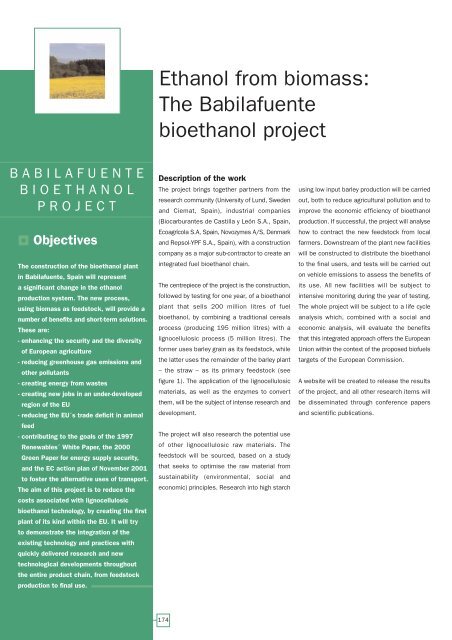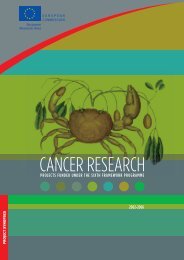European Bio-Energy Projects
European Bio-Energy Projects
European Bio-Energy Projects
You also want an ePaper? Increase the reach of your titles
YUMPU automatically turns print PDFs into web optimized ePapers that Google loves.
BABILAFUENTE<br />
BIOETHANOL<br />
PROJECT<br />
Objectives<br />
The construction of the bioethanol plant<br />
in Babilafuente, Spain will represent<br />
a significant change in the ethanol<br />
production system. The new process,<br />
using biomass as feedstock, will provide a<br />
number of benefits and short-term solutions.<br />
These are:<br />
- enhancing the security and the diversity<br />
of <strong>European</strong> agriculture<br />
- reducing greenhouse gas emissions and<br />
other pollutants<br />
- creating energy from wastes<br />
- creating new jobs in an under-developed<br />
region of the EU<br />
- reducing the EU´s trade deficit in animal<br />
feed<br />
- contributing to the goals of the 1997<br />
Renewables´ White Paper, the 2000<br />
Green Paper for energy supply security,<br />
and the EC action plan of November 2001<br />
to foster the alternative uses of transport.<br />
The aim of this project is to reduce the<br />
costs associated with lignocellulosic<br />
bioethanol technology, by creating the first<br />
plant of its kind within the EU. It will try<br />
to demonstrate the integration of the<br />
existing technology and practices with<br />
quickly delivered research and new<br />
technological developments throughout<br />
the entire product chain, from feedstock<br />
production to final use.<br />
Ethanol from biomass:<br />
The Babilafuente<br />
bioethanol project<br />
Description of the work<br />
The project brings together partners from the<br />
research community (University of Lund, Sweden<br />
and Ciemat, Spain), industrial companies<br />
(<strong>Bio</strong>carburantes de Castilla y León S.A., Spain,<br />
Ecoagrícola S.A, Spain, Novozymes A/S, Denmark<br />
and Repsol-YPF S.A., Spain), with a construction<br />
company as a major sub-contractor to create an<br />
integrated fuel bioethanol chain.<br />
The centrepiece of the project is the construction,<br />
followed by testing for one year, of a bioethanol<br />
plant that sells 200 million litres of fuel<br />
bioethanol, by combining a traditional cereals<br />
process (producing 195 million litres) with a<br />
lignocellulosic process (5 million litres). The<br />
former uses barley grain as its feedstock, while<br />
the latter uses the remainder of the barley plant<br />
– the straw – as its primary feedstock (see<br />
figure 1). The application of the lignocellulosic<br />
materials, as well as the enzymes to convert<br />
them, will be the subject of intense research and<br />
development.<br />
The project will also research the potential use<br />
of other lignocellulosic raw materials. The<br />
feedstock will be sourced, based on a study<br />
that seeks to optimise the raw material from<br />
sustainability (environmental, social and<br />
economic) principles. Research into high starch<br />
174<br />
using low input barley production will be carried<br />
out, both to reduce agricultural pollution and to<br />
improve the economic efficiency of bioethanol<br />
production. If successful, the project will analyse<br />
how to contract the new feedstock from local<br />
farmers. Downstream of the plant new facilities<br />
will be constructed to distribute the bioethanol<br />
to the final users, and tests will be carried out<br />
on vehicle emissions to assess the benefits of<br />
its use. All new facilities will be subject to<br />
intensive monitoring during the year of testing.<br />
The whole project will be subject to a life cycle<br />
analysis which, combined with a social and<br />
economic analysis, will evaluate the benefits<br />
that this integrated approach offers the <strong>European</strong><br />
Union within the context of the proposed biofuels<br />
targets of the <strong>European</strong> Commission.<br />
A website will be created to release the results<br />
of the project, and all other research items will<br />
be disseminated through conference papers<br />
and scientific publications.

















